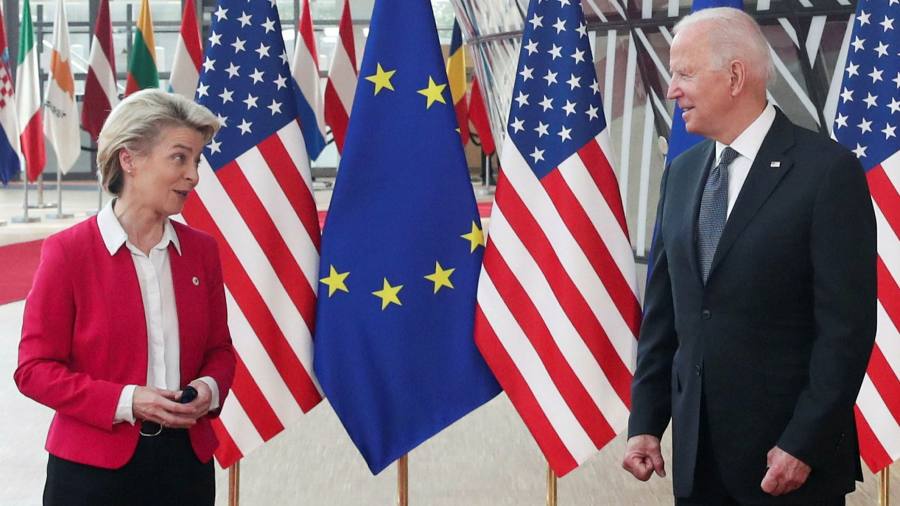
Trade harmony is music to the ears of the liberal world order
In the whirlwind of summits held during President Joe Biden’s week in Europe — G7, Nato, US-Russia and a stream of bilateral meetings — one of the least commented on may be the most consequential. The EU-US summit last Tuesday marks a tidal change in the transatlantic relationship, and in the west’s previously ebbing influence in the world.
The headlines focused on the most specific achievement — an agreement to put an end to the long trade war over aircraft makers’ subsidies. Welcome though that was, it misses what really mattered in the summit and indeed in the aviation deal itself. Suspending trade sanctions for five years may or may not solve the Boeing-Airbus conflict. Much more important is that the conflict is parked, good faith is re-established and both sides are committed to policymaking guided by their shared values and interests rather than the issues that divide them.
The implications go far beyond conventional trade liberalisation or ending the tariff war from Donald Trump’s presidency. Both Europe and the US have increasingly instrumentalised trade policy in the service of non-commercial values and geostrategic concerns. This tendency will now be much more co-ordinated.
The summit statement makes clear that trade is becoming a shared geopolitical tool, “to help fight climate change, protect the environment, promote workers’ rights, expand resilient . . . supply chains” among other things. Even when China is not mentioned, perhaps in a nod to European squeamishness, there is no doubt who is meant by “non-market economies that are undermining the world trading system”.
The most significant outcome is the establishment of a US-EU Trade and Technology Council. Count that as a score for the EU, which proposed precisely this to the incoming US administration in December. Brussels may even be slightly taken aback by how Washington has embraced the idea and run with it. The council will involve three of Biden’s cabinet members — the secretary of state, commerce secretary and trade representative — and various working groups on everything from technology standards and data governance to investment screening and security and human rights issues.
We can reasonably hope for two positive results. One is a more aligned approach to governing the digital economy. This should make it easier to deepen digital trade and data transfers between the two economies. It helps that the US has moved fast towards a more European approach to disciplining private tech companies. The latest sign of this shift is Biden’s appointment of Lina Khan, a critic of Big Tech’s market power, as competition regulator.
The second is more collaboration in standard-setting. That includes the internet — the summit statement sets “the aim of promoting a democratic model of digital governance” — but should extend to physical technological standards. At a time when China is actively seeking to dominate global standard-setting, a more tight-knit transatlantic approach is a game-changer.
I used to be resigned to the emergence of a “splinternet”, with growing digital barriers between the US, EU and China as they set up different rules for the digital economy. I am now more optimistic that regulatory splintering can be minimised across the Atlantic. That would drastically change the balance of influence on governance and standards adopted elsewhere, raising pressure on China to adapt to the western model rather than the other way round.
Of course, hard work remains to be done. Both sides are jealous of their regulatory sovereignty and aware of their competitive rivalry. Moreover, previous incarnations of co-operation councils have disappointed. But today is different: the perception of joint vulnerability is greater, the Trump era is fresh in people’s memory, and the sense that the global economic rules are being quickly rewritten is overwhelming. It is more promising to collaborate on writing new rules than to try to resolve US-EU differences about the old ones.
None of this will make a conventional EU-US trade deal more likely. But that is not the point. In the 21st century, trade policy is increasingly about finding common approaches to domestic regulation — to smooth trade flows, yes, but just as importantly to set the global rules of the game.
The summit puts wind in the sails of Biden’s plan to show that the world’s democracies can work together to deliver better outcomes for citizens than the alternatives promoted by strongmen around the globe. With the reinvigorated EU-US relationship, the old liberal world order lives to fight another day, and then some.
Stay connected with us on social media platform for instant update click here to join our Twitter, & Facebook
We are now on Telegram. Click here to join our channel (@TechiUpdate) and stay updated with the latest Technology headlines.
For all the latest Education News Click Here
For the latest news and updates, follow us on Google News.

